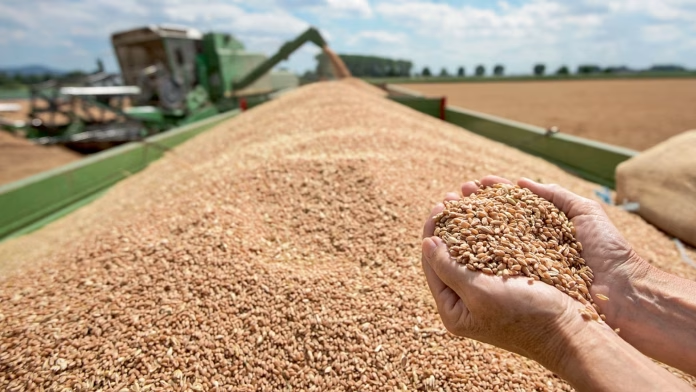In an effort to tackle the increasing retail prices of essential commodities, the Indian government has announced the upcoming sale of 400,000 tonnes of wheat and 500,000 tonnes of rice from its buffer stock. These quantities will be made available through the first round of auctions, targeting bulk consumers and traders. These proactive measures are a crucial component of the government’s long-term strategy to control the soaring retail prices of these widely consumed foodgrains.
According to an official cited by PTI, the government is committed to employing various strategies to lower retail prices, one of which involves reducing the duty on wheat.
To enhance domestic supplies and regulate prices, the Food Corporation of India (FCI), the government’s primary organization responsible for procuring and distributing foodgrains, has announced upcoming e-auctions. On June 28, an e-auction for wheat will take place, followed by a rice e-auction on July 5. The tender notifications for these auctions will be released shortly.
FCI Chairman and Managing Director Ashok K Meena, said, “We are seeing an inflationary trend in retail prices of wheat and rice. The government has directed us to start the Open Market Sale Scheme (OMMSS). The focus is on bringing down retail prices.”
The government took action on June 12 by implementing stock limits on wheat, effective immediately until March 2024, in an effort to prevent hoarding and control the escalating prices. Additionally, the government made a decision to release 15 lakh tonnes of wheat from the central pool to bulk consumers and traders through the OMSS (Open Market Sale Scheme). While the Centre had previously planned to sell rice to bulk buyers through the OMSS, the exact quantity of rice to be sold was not specified.
“We are issuing the tender for wheat tonight (Friday) and the first round of auction for 4 lakh tonnes will be held on 28th June. The auction of 5 lakh tonnes of rice will be held on July 5,” he said.
In this e-auction, there is a maximum limit of 100 tonnes for the quantity that a buyer can bid for. However, for small wheat processors and traders, a minimum quantity of 10 tonnes has been set.
The reserve prices for wheat have been set at INR 2,150 per quintal for Fair and Average Quality (FAQ) grain and INR 2,125 per quintal for under relaxed specifications (URS). Similarly, the reserve price for rice has been established at INR 3,100 per quintal.
Meena mentioned that the bidding process is restricted to local buyers as an additional measure. This restriction is enforced by verifying the GST registration of the state before the stocks are released. Furthermore, in order to identify genuine processors and traders, it is mandatory for participants to hold a valid FSSAI license.
In order to tackle wheat hoarding, the government has mandated the requirement of declaring wheat stocks in the wheat stock monitoring system portal for participation in the auctions. When asked about the total quantity of rice to be sold through the OMSS, Meena stated that a decision has not yet been reached on that matter.
Nevertheless, he mentioned that the government currently possesses an excess stock of 87 lakh tonnes of wheat and 292 lakh tonnes of rice, which can be utilized for the OMSS if the situation demands. It’s important to note that this surplus quantity of foodgrains remains available even after fulfilling the requirements under the National Food Security Act, other welfare schemes, and buffer stock regulations.
Meena emphasized that the government is implementing a scheme to distribute free food grains to 80 crore individuals in accordance with the food law.
Through the OMSS, it was stated that the government aims to ensure that the remaining 60 crore individuals have access to wheat and rice at an affordable price.
The CMD of FCI expressed optimism that retail prices would begin to decrease in the near future.
“All available options, including reduction of import duty on wheat, will be exercised if needed to bring down the retail prices,” Meena asserted.
Currently, the import duty on wheat stands at 40 percent. In the previous year, the government had imposed a ban on wheat imports in order to enhance domestic supply and manage prices. Additionally, the government had successfully sold 34 lakh tonnes of wheat through the OMSS during the last fiscal year.
On June 12, the Union Food Secretary, Sanjeev Chopra, announced the implementation of stock limits on wheat. This action was taken in response to the presence of “unscrupulous elements” who were hoarding the stock and causing an artificial scarcity, leading to a nearly 8 percent increase in mandi prices over the past month.
“The wholesale and retail prices have not gone up to that much. With the lag, we expect the wholesale and retail prices will also go up as modal mandi prices are showing upswing. The government has imposed stock limit on wheat…” he had said.
The wheat prices in the mandi surged from INR 2,129 per quintal a month ago to INR 2,302 per quintal on June 7.
Wheat traders/wholesalers are now subject to a stock holding limit of 3,000 tonnes, while retailers have a limit of 10 tonnes. For big chain retailers, each outlet is restricted to 10 tonnes, and all their depots are limited to 3,000 tonnes. As for processors, they are required to adhere to a stock holding limit equivalent to 75 percent of their annual installed capacity.





